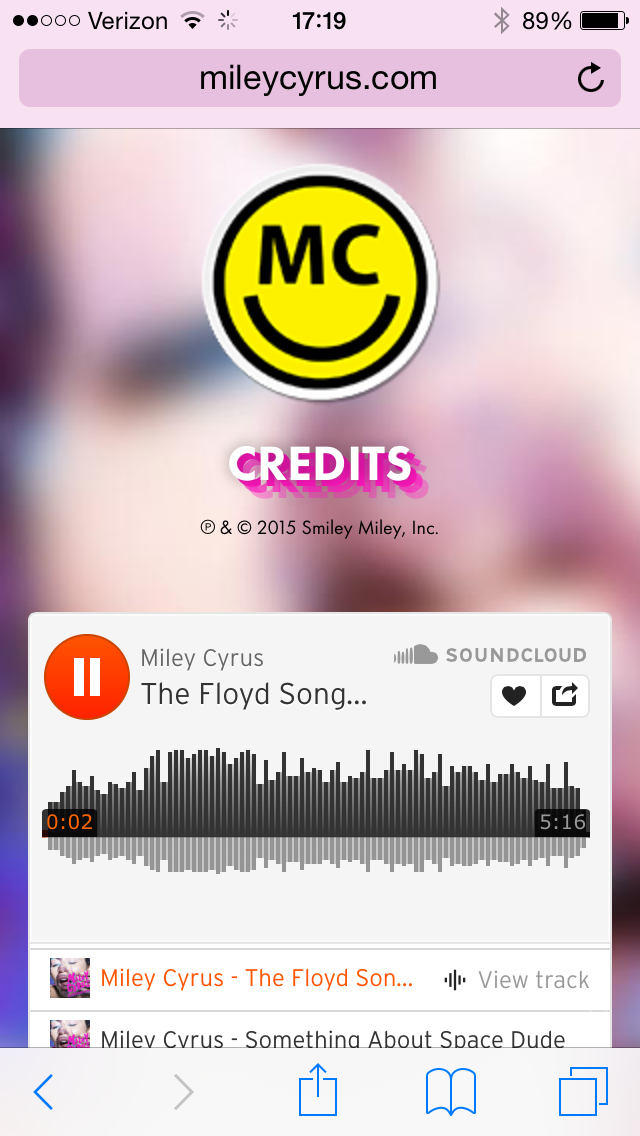People were like, ‘Well, she’s got some good people twisting the knobs to help her break out.’ Now it’s been long enough where they’re like, ‘No one’s telling her what to do.’
 I’ve been meaning to write an essay about the new Miley Cyrus album since the first day I heard it over two months ago. A lot of other things got in the way I guess, a 70+ day series of decisions of that pitted, say, wash the dishes against writing an essay about the new Miley Cyrus album with the dishes chosen. Doing a job that pays me. Watching the Aziz Ansari show on netflix. Singing “Bang Me Box” at my friend’s karaoke party.
I’ve been meaning to write an essay about the new Miley Cyrus album since the first day I heard it over two months ago. A lot of other things got in the way I guess, a 70+ day series of decisions of that pitted, say, wash the dishes against writing an essay about the new Miley Cyrus album with the dishes chosen. Doing a job that pays me. Watching the Aziz Ansari show on netflix. Singing “Bang Me Box” at my friend’s karaoke party.
Even today, I had wholly intended on writing an essay about the new Miley Cyrus album and instead did a deep clean of the kitchen, including a scrub and boil of the beer growlers, started a fire in the fire place, and swept and mopped the living room floor. It just became 5:10 and the second song from Miley Cyrus and Her Dead Petz is already playing, just finishing really, an impassioned plea she made on Saturday Night Live last month:
Don’t let them win
Don’t let them win
Don’t let them win
Don’t let them win
Don’t let them win
Oh, Don’t let them win
Oh, Don’t let them win
Don’t Let them win
Don’t get me wrong: the fire building, growler boil, floor mopping is not separate from the writing, inasmuch as one can separate the coffee preparation from the typing sit down that immediately follows. On that note I’m going to go get a refill—fully knitting the coffee into the tapestry of this work, which the razz jack’s got me all kinds of excited to get underway.
COFFEE!

Because of a faulty button this pill rip-off was only 20 bucks from grocery outlet when I got it this summer so I could listen to music while riding my bicycle. It is amazing—usb charged, blue tooth capable, radio playing—and I have been blasting Miley while riding my bicycle since September. Fun fact: I turned 30 the day before this album came out and I have done nothing as consistently as a 30 year old—other than smoke weed and drink coffee—than listen to this album.
So the third song is finishing up—I just went to google it to make sure it was “The Floyd Song (Sunrise),” before realizing that I am listening to the album on soundcloud on my phone and can just refer to the track list a foot from my hand—and since writing that I have restarted it from the beginning and taken a screenshot of soundcloud playing on safari for illustration purposes.
There are many places we could go right now with more or less coherence—the fact that the album was released for free on soundcloud, the miracle of a portable speaker I bought from grocery outlet for 20 bucks—but let’s go with Floyd, Ms. Cyrus’ deceased dog.

In the days following the surprise release of Miley Cyrus and Her Dead Petz I became obsessed with its mythology. Ms. Cyrus gave an interview with The New York Times to be released in conjunction with her hosting of the Video Music Awards, performance of “Dooo it!” with past and present cast members of RuPaul’s Drag Race, and, of course, the creation of the soundcloud supported mileycyrusandherdeatpetz.com. The interviewer describes Ms. Cyrus chain-smoking blunts and talking about how coyotes ate her dog when she was on tour and then being in the hospital in Oklahoma City and Wayne Coyne being there for her, then suggesting an eastern healer that allowed her to pull Floyd out of her lungs, place him on her shoulder, pet him for what felt like hours, and then let him float away INTO WAYNE COYNE! She actually said about Floyd’s transition into non-existence, “What he was to me, Wayne has become.”
Now that she was at peace with the death of her dog, Ms. Cyrus was able to move on, yet with the energy of Floyd her dear companion in the presence of Wayne Coyne. Additionally, the collaboration and newfound cosmic realization allowed her to further explore the artistic movement forward she’s been seeking since becoming an adult/enthusiastic weed smoker. The idea of a dead pet becomes a perfect expression of existential conundrums that are both childish and infinitely profound. There then develops a kind of trinity on the album between the abyss, which comes in many forms, sexual liberation, and getting hella fucked up, which all loosely tie back into wherever in the stoner imagination love, nothingness, and weed fuse where perception cannot fully voyage.
The sunrise insists on gladness
But how can I be glad now my flower is dead
Oh, sun, I see you happy
You made the morning dew
Now you’re showing me the truth
I don’t want to believe you
Ms. Cyrus chokes up delivering “I don’t want to believe you” in a way that invokes Coyne delivering a classic Flaming Lips almost-out-of-tune cracked croon, and classic early ’60s performative teeny bop pining. The refusal of the grieving to accept the simple lesson of the sunrise, the idea of new beginning made aesthetic, is the natural right and a beautiful expression of confusion and rage at the idea of death and loss. This song is an essential feeling in the fabric of the work, but stuck after the affirmative anthem that starts off the album
Yeah, I smoke pot
Yeah, I love peace
But I don’t give a fuck
I ain’t no hippie
and the song imploring Karen not to be sad, (the aforementioned “Don’t let them win”), setting up an abstract space-themed transition into what I have come to consider the album’s Sex Triad after a heavily tweaked sample of her saying “ok this is really fucking fucked up.” Her ’90s-style talking verse treatise against PDA—”the fucking goo”—implores to addressee of the song to “fuck her so [he’ll] stop baby talking.” Bookended by the anthemic beginning and end to the Sex Triad is “Fweaky,” which like many songs seems to point as much to the themes and songs of the rest of the album as much as it exists as a singular piece, with the simplistic slow jam breathy
Shit’s ’bout to get real freaky I can feel it
I hope you’re ready, I’m into whatever
Shit’s ’bout to get real freaky I can feel it
Don’t you worry, you won’t regret it
refers to an impending love session as much as it does to the next song, the standout track, in this author’s opinion, of the whole album, “Bang Me Box.”
There are a shit ton of ways to think about this album, including the obvious one that it falls into the tradition of the lush and epic Flaming Lips concept album, like The Soft Bulletin‘s loose and subtle feeling that it is the soundtrack to a movie that doesn’t exist, but whose plot can be divined by those either imaginative or stoned—or both—enough to meet the songs part way. Or like Zaireeka, which required the listener to acquire 4 stereos and three friends to play four CDs at the same time as an expression of awe toward the accidental, the magic both intended and not by combining certain forces—like psychedelic indie rock and images of a japanese woman battling robots, like Christmas and Mars, like Miley Cyrus making an album with Wayne Coyne which is actually amazing.
About “Bang Me Box,” I can only say, if you want to approach it openly, wanting it to delight, listening to it as loud as comfortable with room to move yourself, this will be the best song you’ve heard all year. Of you will also be required a sense of humor, which will also needed to be allotted to Ms. Cyrus, which I understand many will not. This author acknowledges that women, not to mention celebrities, not to mention outlandish performers, not to mention admitted partakers of a variety of drugs, not to mention former child stars, are generally not even given subjectivity, much less the benefit of the doubt that they know that something ludicrous they are doing, saying, or singing is indeed ludicrous, and that they are doing anyway even if it is, if not because it is, ludicrous.
Ms. Cyrus represents a great power to rework pop culture to those who want her to. She is escaping the slut-shaming heteronormative Christian world of American myth-making—she’s done with celebrity culture, polish, rules, and hypocrisies—and the most Christian, heterosexual American awfulness—Disney—gave her the power to do so, becoming fully self-aware and liberated at the age of 22, not just rejecting infantilization as she did 2 years ago, but mainstream consumerist expectations of what she is supposed to do with her time. She is making bedroom-sounding ’90s-style lo-fi tracks in between bong rips just for the sake of doing it. Giving it away on soundcloud as what she wants to do, before she gets around to what she has to do in her contract. Ms. Cyrus represents a glitzy and marketable fuck you to everything wrong with pop culture—but even though I personally have listened to the full 23 tracks on soundcloud—if not only the nearly perfect dozen-song run—it has not remade contemporary pop music into an anti-marketing beast, ironically enough just because it was not sold to people, packaged for Wal Mart, because its fluidity between existence and non-existence, the very themes it expounds for over an hour, was not bottled and shut down. It runs like the potable water from the tap that those in this country have been trained to distrust, even when they’ll pay dollars cash for it once its tinted blue with Dasani written on it.
I’ve been smoking Razz Jack, a descendant of the great Jack Herer, an often sativa-leaning 50/50 hybrid and Rasberry Kush, named for the weed-enthusiast Jack Herer. I sure have been enjoying sitting here listening to the new Miley Cyrus for the 50th goddamn time as the fire dies down, and I think of how much power Ms. Cyrus has really released to us in the last months, sonically or otherwise. Are we all really free to be ourselves, following rules we make ourselves as long as no one else is harmed, as J. Stu Mill advised—is Ms. Cyrus, in the words of Mills in On Liberty, “sovereign,” “over herself, over her body and mind”? Or is she right, in her own words, to believe “The only laws I obey, the ones I’m makin’ for myself”? Whether she’s right or not, the fact remains “self-control is not something I’m working on right now.”
Mill wrote of the essential uniqueness of every individual, that anything that hinders the outlying perspective deprives human consciousness of expansion. “Human nature is not a machine to be built after a model, and set to do exactly the work prescribed for it,” he writes, “but a tree, which requires to grow and develop itself on all sides, according to the tendency of the inward forces which make it a living thing.” Is this album the most contradictory yet liberating sound to be produced in this century, a beautiful expression of the ability of individual humans to confront and overcome the faceless, mass-production of factory-cut identities sold to us—or is this weed just really good?
I’ll leave you with album’s final meditations on a dream in which David Bowie, dressed as Gumby, shows Ms. Cyrus how to skateboard:
What does it mean?
What does it mean? What does it mean?
I had a dream
What does it mean? What does it mean?
I had a dream
But what does it mean? What does it mean?
What does it all mean?

